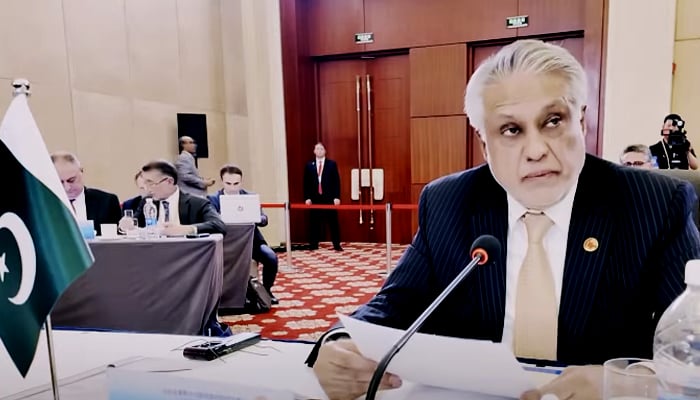At SCO, Pakistan says committed to ceasefire, warns India against arbitrary use of force
"Pakistan remains steadfast in its commitment to the ceasefire and the cultivation of a stable regional equilibrium," says Dar
July 15, 2025

- Dar says all disputes must be resolved via dialogue.
- Urges SCO to remain platform for regional stability.
- "Pakistan adopted restrained approach despite provocative rhetoric."
Pakistan has reiterated its commitment to maintaining the ceasefire with India but cautioned against normalising the arbitrary use of force, weeks after the two neighbours saw their worst conflict in decades.
Speaking at the Shanghai Cooperation Organisation (SCO) Council of Foreign Ministers meeting in Tianjin, China, Dar said Pakistan remained fully committed to the regional ceasefire and a balanced security environment.
However, he cautioned that peace could not be achieved if coercion and aggression were allowed to become standard tools of statecraft.
“Today, Pakistan remains steadfast in its commitment to the ceasefire and the cultivation of a stable regional equilibrium,” Dar said. “But we cannot accept that the arbitrary use of force is normalised.”
The heaviest fighting in decades between Pakistan and India was sparked by an April 22 attack in Indian Illegally Occupied Jammu and Kashmir (IIOJK) that killed 26 people, most of them tourists. New Delhi blamed Pakistan for the attack, a charge denied by Islamabad.
In response to India's cross-border strikes, Pakistan had launched Operation Bunyan-um-Marsoos after downing six Indian Air Force jets, including three Rafales in response to Indian aggression.
The two countries, following four days of armed conflict, agreed on a US-brokered ceasefire on May 10.
During his address today, the foreign minister stressed that all disputes and differences must be resolved through dialogue and diplomacy, rather than conflict and confrontation. “Initiation of a comprehensive and structured dialogue can meaningfully address the full spectrum of issues that have long bedeviled peace and security in South Asia,” he added.
Dar also emphasised the importance of strictly adhering to bilateral agreements as a prerequisite for restoring regional confidence and preventing future escalations.
Referring to recent tensions in South Asia, Dar said Pakistan had adopted a restrained and responsible approach despite provocative rhetoric and “strategic recklessness” from its neighbor.
"The events unfolding since 22 April 2025 also reaffirm a central truth of South Asian geopolitics… the peaceful settlement of the longstanding unresolved disputes is imperative for an enduring peace in the region," he added.
He urged the SCO to remain a platform for regional stability based on mutual respect and the sovereign equality of states, stating that durable peace requires resolving unresolved disputes through fair and lawful means.
Pakistan, he noted, was ready to work with all regional partners under the SCO framework to advance peace, development, and connectivity through collective cooperation rather than confrontation.
'Stabilising force'
Meanwhile, the foreign minister reiterated that Pakistan values the SCO as a platform of immense political, strategic and economic importance.
"At a time when the global order is experiencing profound challenges, SCO has emerged as a stabilising force," he said, noting that its inclusive approach underscoring the sovereign equality of states and seeking peaceful resolutions to disputes, offers a compelling alternative to aggression, confrontation and zero-sum rivalries.
"The SCO’s commitment to consensus, development, and mutual respect is a beacon of hope for building a better and equitable world."
He reaffirmed Pakistan's adherence to the goals and principles of Charters of the UN, the SCO and other universally recognised principles and norms of international law.
"In our pursuit to peace and security, we believe in non-aggression, non-interference in internal affairs; non-use of force or threat of its use in international relations, as well as seeking no unilateral military superiority in the region," he added.
"We emphasise on resolution of longstanding disputes through peaceful means, dialogue, diplomacy and according to the principles of international law, justice and fairness."
Recognising the need to strengthen SCO structures in line with contemporary requirements and evolving challenges, Dar said that Pakistan supports the ongoing modernisation process and remains constructively engaged in its advancement. "The establishment of four new Centers dealing with various aspects of security would strengthen cooperation among SCO countries."
'Terrorism'
He also addressed the rising terror activities across the globe, saying that terrorism was the common concern of humanity that threatens the global security.
All forms of terrorism including state terrorism are condemnable, he said, adding: "We must shun the use of terrorism for political purposes and combat this menace through a cooperative approach including addressing its root causes."
Speaking about Afghanistan, Dar noted that enduring peace and stability in Afghanistan constitute a cornerstone of shared aspiration. "In this context, the revival of the SCO-Afghanistan Contact Group could serve as a valuable platform for pragmatic and results-oriented cooperation."
He also called for concrete steps within existing SCO’s mechanisms for trade and development and promote the use of national currencies for mutual settlement within SCO region to avoid international financial shocks. "We support the proposal to create SCO alternative development funding mechanism to give needed impetus to various stalled development initiatives."











